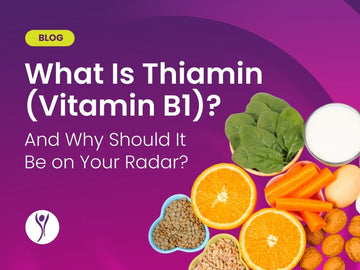by Brenda Hoehn on Jun 13, 2025

Are Vitamins Too Expensive? What Bariatric Patients Should Know About the Real Cost of Skipping Supplements
Let’s be real, everything feels more expensive these days. From groceries to gas, inflation is hitting hard. And for many in the bariatric community, that includes the rising cost of essential vitamins.
But before you ditch your daily supplements, it’s worth asking: Are vitamins really too expensive—or are we overlooking their value?
In this blog, we’ll break down the real cost of bariatric supplementation, why it matters, and how you can protect your health without draining your wallet.
Why Vitamins Matter After Bariatric Surgery
When you choose bariatric surgery, you're making a powerful commitment to your health. This life-changing decision can improve your quality of life, reduce co-morbid conditions, and potentially add years to your life by decreasing risks of diabetes, heart disease, and certain cancers.
But here's the crucial part – surgery is just the beginning. Your long-term success depends on proper nutrition, and that's where supplements become non-negotiable. Regular supplementation helps you stay energized, supports your immune system, and keeps your hair, skin, and nails looking fabulous. It also ensures you’re getting the nutrients your body can no longer absorb from food alone.
In the grand scheme of things, the cost of bariatric vitamins is a small price to pay for feeling your best every day.
The Hidden Costs of Skipping Your Vitamins
While it might be tempting to cut corners on supplements when prices rise, consider this: the cost of treating vitamin deficiencies far outweighs the price of prevention. For example:
- Iron deficiency (anemia) is very common, especially in menstruating individuals or those who’ve had gastric bypass or sleeve. It can take months to correct and may require IV iron.
- Calcium deficiency can lead to bone demineralization, osteopenia, or osteoporosis.
- B12 deficiency can cause fatigue, numbness, memory loss, or permanent neurological damage if untreated. Sublingual or injectable forms are often needed.
- Thiamin (B1) deficiency is rare but serious. Can lead to Wernicke’s encephalopathy, especially during periods of vomiting or rapid weight loss.
- Vitamin D is often low even before surgery. Deficiency can contribute to fatigue, mood issues, and poor calcium absorption.
- Folate (B9) deficiency can cause anemia and fatigue and is important for those of childbearing age or taking certain medications. Folate is often included in bariatric multivitamins.
- Zinc deficiency can cause delayed wound healing, hair loss, and taste changes. Common post-op, especially with poor protein intake.
- Vitamin A deficiency is more common in patients who’ve had a malabsorptive procedure (e.g., DS/SADI) and can affect vision and immune health.
- Protein (macronutrient, not a vitamin/mineral, but critical) – Inadequate protein intake can impair healing, hair growth, and lean muscle maintenance.
What You’re Really Paying For
Not all vitamins are created equal, and the price tag doesn’t always reflect value.
Some high-end brands charge more for flashy packaging or trendy buzzwords. On the flip side, bargain-bin supplements may skip quality ingredients or use forms your body can’t absorb after surgery (like calcium carbonate instead of calcium citrate).
Look for:
- Third-party testing
- Transparent labeling
- Clean formulations without dyes or fillers
- Bariatric-specific forms like TruCal® calcium, calcium-citrate, chelated minerals, or methylated B vitamins
What’s Really Inside That Bottle?
Not all vitamins are created equal, and that’s why prices vary. Ever notice those bargain-bin vitamins that seem too good to be true? Well, they often are.
Cheaper vitamins typically use lower-quality ingredients. For instance, instead of using calcium citrate or TruCal®, which is more bioavailable and bariatric-friendly, they might use calcium carbonate—a form that's harder for your body to absorb. And if you’ve had bariatric surgery, your body needs nutrients in forms it can actually process.
Quality bariatric supplements, like those with premium ingredients, may cost a bit more when comparing to over-the-counter vitamins, but they’re worth it. You’re paying for better absorption, fewer fillers, and peace of mind knowing your body is actually benefiting from what you’re taking.
Making Vitamins Affordable (Even on a Budget)
We know every dollar counts. That’s why ProCare Health offers ways to save:
- Subscriptions: Up to 20% off + discounted shipping rates
- Bulk sizes: 90 or 365-count bottles available
- Free Shipping: On US orders $100+
- Loyalty Program: Earn points, get rewards
- Price Match Guarantee: If you find a better deal, we’ll match it*
The Bottom Line: Are Vitamins Too Expensive?
We totally get it, when everything feels more expensive lately, it’s natural to start questioning what’s really worth the cost. But here’s the truth: your vitamins aren’t just another thing on your to-do list—they’re part of how you care for you.
They help keep your energy up, your body nourished, and your health on track, especially after bariatric surgery. And while the price tag might give you pause, the value inside that little bottle? It’s doing a lot of heavy lifting for your long-term wellness.
So if you’ve ever caught yourself wondering, “Are vitamins too expensive?”—just know you’re not alone. But when you look at what they help you avoid down the road, they start to feel more like a smart investment than a splurge.
You deserve to feel your best, and we’re here to help make that as affordable and doable as possible.
The ProCare Promise
As a company founded on understanding bariatric patients' needs, we're committed to keeping our supplements accessible without compromising on quality. We manufacture in certified-Good Manufacturing Practice (cGMP) facilities and maintain complete transparency about our testing and ingredients.
Remember: Your health is an investment, not an expense. While inflation might be pushing prices up across the board, we're working hard to keep our supplements affordable while maintaining the premium quality you deserve.
Ready to Reassess Your Supplement Routine?
If you’re rethinking your vitamin choices, start with a brand that puts your health—and your wallet—first.
Explore our full collection of bariatric vitamins and calcium products or take our Vitamin Finder Quiz to find the right fit for your journey.

Is Your Body Asking for More Calcium?



